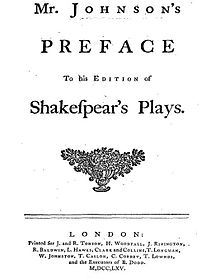 Just a quick post this time to announce the I’ve been invited to speak at a conference in Pembroke College, Oxford, marking the 350th anniversary of Samuel Johnson’s edition of the plays of Shakespeare. The event will take place in August 2015, so – all being well – I should have finished writing my thesis by then. As for my chosen topic, I’ll be in the ‘Johnson and Shakespeare’s Women’ panel, doing something with a vague resemblance to this proposal…
Just a quick post this time to announce the I’ve been invited to speak at a conference in Pembroke College, Oxford, marking the 350th anniversary of Samuel Johnson’s edition of the plays of Shakespeare. The event will take place in August 2015, so – all being well – I should have finished writing my thesis by then. As for my chosen topic, I’ll be in the ‘Johnson and Shakespeare’s Women’ panel, doing something with a vague resemblance to this proposal…
Delusion and Illusion: Elizabeth Montagu’s Critique of Samuel Johnson
Samuel Johnson disappointed Elizabeth Montagu. In her view, the preface for his 1765 edition of Shakespeare’s plays failed to “address the particular excellencies of Shakespear as a Dramatick poet.” It is the contention of this paper that when Montagu came to write her own Essay on the Writings and Genius of Shakespeare […] with some Remarks Upon the Misrepresentations of Monsieur de Voltaire (1769), she intended not only to answer the French critic’s aspersions but also to improve on Johnson.
Fiona Ritchie and Elizabeth Eger have already noted that beneath Montagu’s critique of Voltaire there lies a covert dialogue with Johnson. Yet the importance of this connection for the study of Shakespeare and of drama in general merits further investigation.
The matter in question turns principally on the topic of dramatic illusion. Johnson’s spectators are “always in their senses”, but Montagu’s are transported “to the very capitol of Rome” by Shakespeare. Such transport is necessary for the moral education of the audience, a process essential to Montagu’s understanding of Shakespeare’s craft but questioned by Johnson. For Montagu, the “Dramatick poet” must write to create illusion in performance, forming sympathetic bonds with his audience that serve as conduits for moral education. For Johnson, “a play read affects the mind like a play acted” and axioms drop “casually” from the playwright’s pen.
The meeting of these two influential eighteenth-century figures entails a battle of definition, one that is still relevant today. Together, the ‘Preface’ and the Essay have two aims: to tell us what Shakespeare is, and, thus, what it means to be “Dramatick” too.